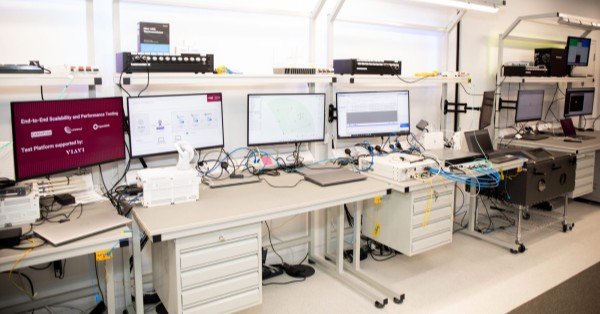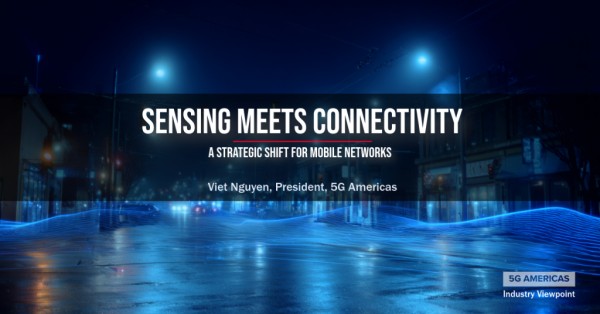In collaboration with Deutsche Telekom, Merseburg University of Applied Sciences has launched the first 5G campus network in the region. This network aims to foster innovation, research, and the development of advanced digital technologies in the region. The project is part of Saxony-Anhalt’s broader investment strategy to boost digital infrastructure and drive regional structural transformation.
Overcoming Digital Infrastructure Challenges in Saxony-Anhalt
The region around Merseburg is undergoing significant economic and industrial changes. To support this transition, state-of-the-art digital infrastructure is necessary. Traditional mobile networks are not equipped to handle the specific demands of modern research institutions and industries. Low latency, high-speed data transmission, and secure communication are vital for innovation in fields like autonomous driving, logistics, and augmented reality (AR).
How Deutsche Telekom’s Private 5G Network Powers Innovation at Merseburg University
Deutsche Telekom, using 5G standalone (SA) technology, provided a custom 5G private network for the university. A total of 44 antennas were installed—32 indoor antennas for the Merseburg Innovation and Technology Center (MITZ) and 12 for the university, along with five outdoor antennas. The system utilizes industrial frequencies in the 3.7 to 3.8 GHz range, reserved exclusively for the university, ensuring secure and reliable service.
Real-World Applications: 5G Drone Demonstration at Merseburg Digital Days
The deployment of the 5G network at Merseburg University is not just theoretical. During the Merseburg Digital Days, attendees witnessed a live demonstration of a 5G-enabled drone operating within the network. This successful field test showed the network’s capacity for real-time, low-latency applications. Additionally, indoor 5G positioning technology was used for the first time in MITZ, enabling real-time location tracking of materials, essential for optimizing production and logistics processes.
Why Merseburg University Chose 5G Standalone for Its Campus Network
Merseburg University opted for Deutsche Telekom’s “Campus-Netz Private” solution, which is built on 5G standalone architecture. This technology offers significant advantages, including ultra-low latency and the ability to process data directly on-site, ensuring high security and performance. Ericsson’s solutions were integral to the network infrastructure, particularly for positioning technology, a first for indoor applications.
Key Advantages of Merseburg University’s Private 5G Network for Research and Industry
The private 5G network at Merseburg University provides many advantages:
- High security: All data traffic stays within the local network, ensuring data integrity.
- Maximum performance: The network is optimized for high-speed data and ultra-low latency.
- Exclusive access: The university and MITZ benefit from industrial-grade frequencies, providing up to 100 MHz of bandwidth for research and commercial applications.
How Merseburg’s 5G Campus Network is Shaping the Future of Regional Innovation
The launch of this network positions Merseburg University as a hub for 5G research and innovation. It enables experiments in autonomous driving, real-time logistics, and even healthcare applications, all of which require the advanced capabilities of 5G technology. Moreover, it encourages collaboration between academia and industry, as local businesses can test and refine 5G applications.
Deutsche Telekom’s Role in Deploying Merseburg University’s 5G Network
Deutsche Telekom played a crucial role in the design and implementation of this 5G private network. As a trusted telecom leader, they provided the necessary infrastructure and technological expertise. Their involvement extended from network installation to live demonstrations and ongoing support, ensuring that the network operates at its best.
Ericsson’s Cutting-Edge Positioning Technology Boosts Merseburg’s 5G Capabilities
Ericsson, as a key technology partner, contributed its state-of-the-art positioning solution, which is critical for the efficiency of industrial applications such as warehouse management and production line optimization. Their solution is based on the latest 3GPP standards, ensuring the university has access to cutting-edge technology.
Merseburg University’s 5G Campus Network Now Fully Operational
The network is fully operational, with both the university and MITZ already using it for various research projects. The initial phase of deployment is complete, and further optimizations and use cases are expected as part of the university’s “MerInnoCampus” development strategy. The Merseburg Digital Days showcased the network’s potential and highlighted its impact on regional innovation.
The project started with a Europe-wide tender, and Deutsche Telekom was selected as the winning bidder. The network construction took several months, with the official launch happening during the 2023 Merseburg Digital Days. The 5G network is set to operate over a seven-year period, with ongoing updates and improvements as necessary.
Ministerial Support for Merseburg’s 5G Network and Its Regional Impact
Minister Dr. Lydia Hüskens, speaking at the launch event, emphasized that 5G will play a pivotal role in driving structural change in the region. She highlighted the network’s potential to attract businesses, improve quality of life, and support research and development. Additionally, Linus Schade, representing Deutsche Telekom, noted that this project builds on the company’s previous 5G successes in Merseburg, including the first-ever 5G phone call on their network.
The 5G campus network at Merseburg University represents a significant step forward for digital innovation in Saxony-Anhalt. By providing a secure and high-performance platform, it lays the foundation for future technological advancements and industry collaboration.




























